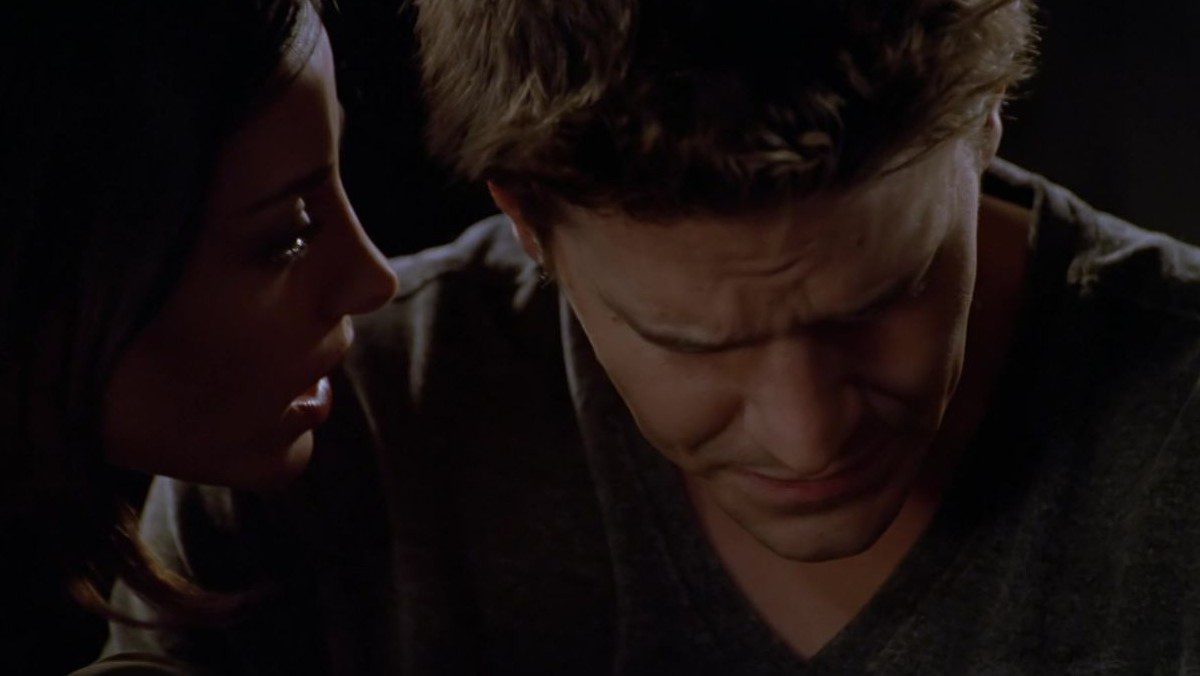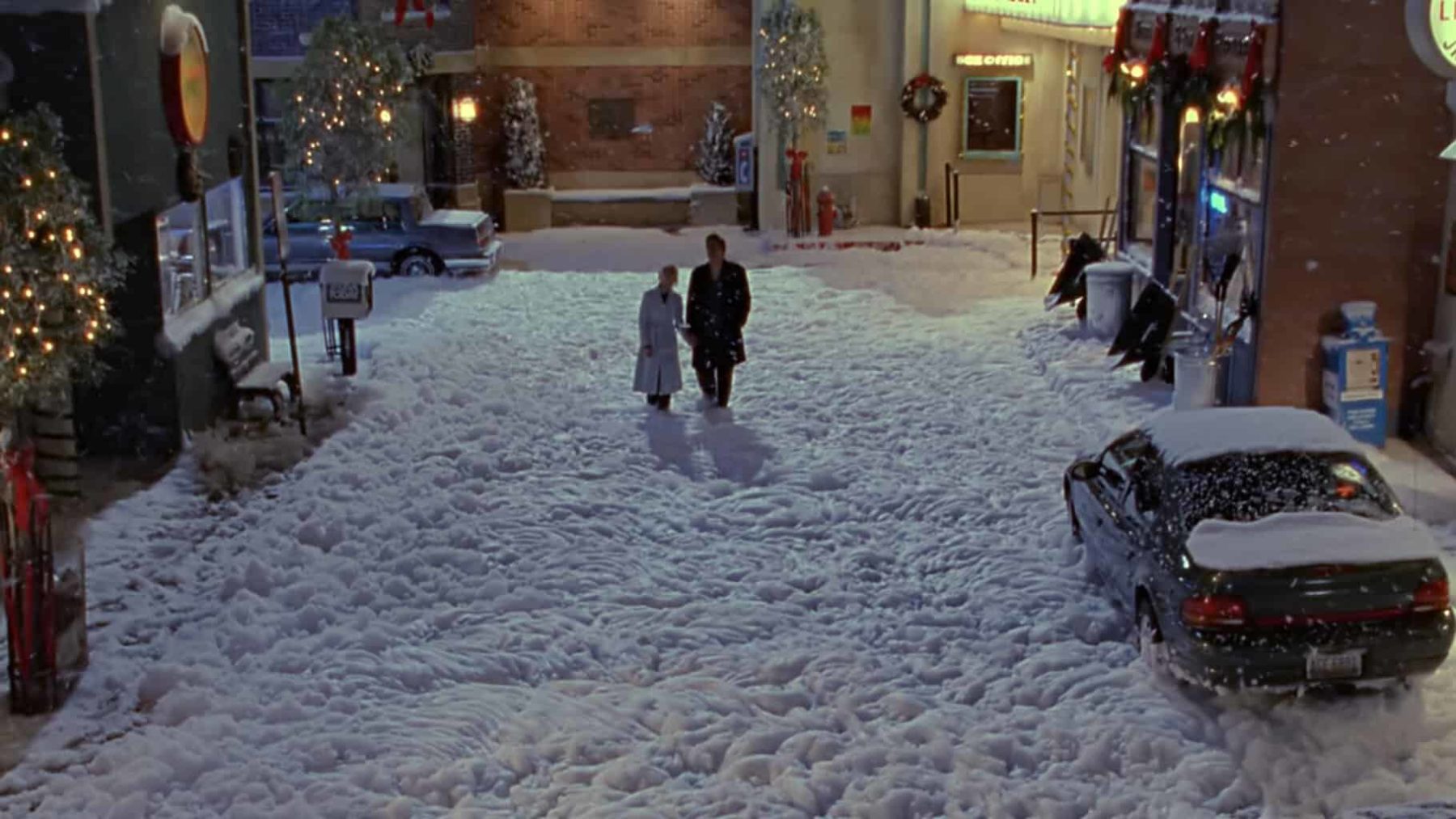“What can we forgive?” – Officer Jim Kurring (Magnolia)
Growing up, I was taught that Christmastime was a time of forgiveness. That still makes sense to me. Forgiveness can sometimes feel like a miracle, and although it’s not always the easiest thing to do, the reward of such an act can be bountiful.
At the same time, there is also the need to be open in accepting forgiveness. If one has done supposedly unforgivable acts, it can be difficult for this person to not only ask for amends. It can become nearly impossible for this person to understand that they, too, can be forgiven.
Giving and accepting forgiveness is at the forefront of “Amends,” the Christmas episode of Buffy the Vampire Slayer from 1998. I’ve watched it every year since then, and every time I’m struck with how writer-director Joss Whedon approaches what I mentioned above. At this point in Season 3, several characters are dealing with or not dealing with this theme:
- Buffy (Sarah Michelle Gellar) and Angel (David Boreanaz) haven’t dealt with what transpired in the back half of the previous season.
- The same goes for Angel and Giles (Anthony Stewart Head).
- Xander (Nicholas Brendon) and Cordelia (Charisma Carpenter) have recently broken up, which ties in with
- Willow (Alyson Hannigan) and Oz (Seth Green).
- Last, but certainly not least, is Buffy and Faith (Eliza Dushku), whose relationship hit a snag a few episodes earlier.
Unfortunately, by the episode’s end, not every relationship is mended. Xander and Cordelia don’t even come close to any kind of amends, and although Giles helps Angel, I’m uncertain if we’re supposed to think they’re on their way back to being on good terms.
This leaves three others. By the end of the episode’s first half, Faith has accepted Buffy’s olive branch, and they seem cool with one another by the time Buffy leaves Faith to protect her mom in case Angel’s gone off the deep end again. Things seem good with them.
As for Willow and Oz, they get a pretty substantial scene together, which seems to set up the episode’s climax. Willow broke Oz’s heart, but he still loves her. After some time apart, it appears he wants things to get back to normal. Willow wants to take this opportunity to prove she’s all in on their relationship, but as Oz tells her in this exchange:
OZ: “And-and it’s all…good. But…when it happens…I want it to be because we both need it to for the same reason. You don’t have to prove anything to me.”
WILLOW: “I just wanted you to know.”
OZ: “I know. I get the message.”
They’re talking about sex, yes, but it’s more than that. Oz is telling Willow that he forgives her. He knows that this was her grand gesture regarding forgiveness. He doesn’t want that, though. He just wants to be with her on Christmas Eve. He doesn’t need anything else but her. He accepts her, and she allows herself to be forgiven.

Angel, though, has quite the time getting there. In fairness, when he was first Angelus, he did some pretty horrendous stuff. We assumed he had killed because he was a vampire without a soul. However, seeing him sexually coerce a servant during a Christmas party is messed up. It makes sense then that when he begins to be tortured by this episode’s Big Bad (which will one day return in the series’ final season), it hurts. He’s a vampire with a soul now, and it’s difficult for him to accept that he was able to return from Hell after all he did when he was Angelus the first time and when he was Angelus the second time:
ANGEL: “I should be in a demon dimension suffering an eternity of torture…but I’m not.”
This is important because as difficult as it is for Buffy and Giles to look at the face of Angel and not see Angelus, it’s even more difficult for Angel, who has the memories of what this demon inside him did for so long, especially to the ones he cared about in Season 2.
It may be cliché but forgiving oneself is necessary in order to accept the forgiveness of others. Angel’s guilt and constant belligerence of the episode’s Big Bad prevent him from achieving this, but thankfully, he’s strong enough to get help, which brings me to an important part of this episode.
Although untrue, growing up, I heard a lot about how suicide rates increase during the holidays. This might be why Whedon chose to make Angel’s journey of self-forgiveness a parable about suicide. The Big Bad takes the form of many of Angelus’ victims, who are literal forms of the past haunting Angel. He seeks counseling in the form of Giles, which taken metaphorically would be, well, Angel seeking counseling from his inner demons, which is clever, in that the demon who called itself Angelus is what Angel is essentially seeking counseling from.
He nearly succumbs to becoming Angelus once again in a borderline disturbing scene where Buffy encounters him in her bedroom. Thankfully, he’s able to fight his demons, but ultimately, he knows the fight is a losing one. He decides the only way out of his guilt is suicide. He believes he does not have the strength to continue fighting. After all, he doesn’t believe he deserves forgiveness. In the episode’s climax, he and Buffy have this exchange:
ANGEL: “Am I a thing worth saving? Am I a righteous man? The world wants me gone.”
BUFFY: “What about me?”
Angel is buried so deep with his guilt and lack of strength that he can’t see that it’s not all about him. Whedon is saying that suicide can be understandable but it’s ultimately a selfish act. To Angel, the world doesn’t care, but Buffy is obviously in this world. Perhaps he needed to be reminded that she would care if he died. Some people need that reassurance sometimes.
Later in the same scene, it’s apparent that Angel actually believes doing this is a form of strength, but Buffy calls him on this bullshit:
ANGEL: “Buffy, please… Just this once… let me be strong.”
BUFFY: “Strong is fighting. It’s hard and it’s painful and it’s every day. It’s what we have to do. And we can do it together. But if you’re too much of a coward for that, then burn. If I can’t convince you that you belong in this world then I don’t know what can. But do not expect me to watch. And don’t expect me to mourn for you, because…”
And then the snow falls.

As for Buffy, her journey in this episode is confronting the reality that although she’s accepted Angel’s return from Hell, she hasn’t actually forgiven him. This can be seen as unfair because it was Angelus who did the horrible things to her and her loved ones. Still, I suppose it’s hard to fault Buffy.
Like Giles, it’s difficult for her to be able to compartmentalize such a thing. As I stated earlier, Angel has Angelus’ face. It’s not his fault, but it is what it is. Buffy must accept this, though, because that’s the only way she can forgive him.
So, Angel must forgive himself. And Buffy must forgive Angel. Throughout “Amends,” though, neither face these truths until the end. Whereas Willow and Oz deal with things fairly directly, it takes a literal suicide attempt to get Buffy and Angel to do the same.
This makes sense to me, though, because both have faced life and death situations to such a staggering degree that having a talk or even an argument in the hopes of resolving something isn’t enough. This is melodrama at its best, and storytelling-wise, Whedon deserves a lot of credit here. He manages to address character moments within the show while managing metaphors that work within a Christmas episode.
According to the Buffyverse Wiki, Joss Whedon had this to say about the episode’s final moments, just as the snow begins falling on Sunnydale, even when it was forecasted that Christmas Day would be hot and sunny:
“The snow was good… was it God? Well, I’m an atheist, but it’s hard to ignore the idea of a ‘Christmas miracle’ here… The fact is, the Christian mythos has a powerful fascination to me, and it bleeds into my storytelling. Redemption, hope, purpose, Santa, these all are important to me, whether I believe in an afterlife or some universal structure or not. I certainly don’t mind a strictly Christian interpretation being placed on this ep by those who believe that — I just hope it’s not limited to that.”
These notions don’t seem all that limited to Christianity to me. Christmas is certainly about the birth of Jesus, but honestly, it’s become a lot more than that. To plenty, it doesn’t have to be a religious time at all. Spiritual, maybe, as Whedon suggests, but I’d argue that most associate Christmas nowadays with Santa Claus more than the Son of God.
As such, “Amends” transcends any religious trappings that can come with the holiday season. Does it really matter how it snowed? It’s Buffy the Vampire Slayer, for crying out loud. I take the ending the way I take most of what happens in the show. It’s metaphor. Angel believes the world wants him gone, so the world (whatever that means) intervenes and takes away Angel’s means of taking his own life.
As their fight comes to an end, it doesn’t seem like there’s simply a ceasefire. That final shot says it all. Buffy’s forgiven Angel, and he’s accepted her forgiveness.
Maybe that’s why the characters who have not reconciled certain relationships are alone by the episode’s end. Xander doesn’t seek out his forgiveness over what he did to Cordelia, so he is alone. Cordelia? We don’t see her, but perhaps she was feeling lonely while on vacation. Maybe. Giles, though, is alone, too, because he still hasn’t forgiven Angel.
But Willow and Oz are together. Faith and Joyce are together, too, symbolizing how both are now on good terms with Buffy. Buffy and her mother forgave each other for what was said at the end of the previous season, and as stated earlier, Buffy and Faith are good (for now).
Forgiveness is such a healthy thing, even if it takes work. Even if it seems worthless at times, it isn’t. During Christmas, it makes sense to apologize. It makes sense to say, “I’m sorry.” It also makes sense to accept that apology and say, “I forgive you.” Making amends is such a release, but you know what? Joy might not necessarily come from it. I mean, it’s not like you see Buffy and Angel running around and dancing in the snow. Still, to be free from such a burden can feel like a miracle. You can go from screaming horrible things to someone you love to holding their hands on Christmas morning.
What can we forgive? As it turns out, quite a bit, as long as we’re willing.

